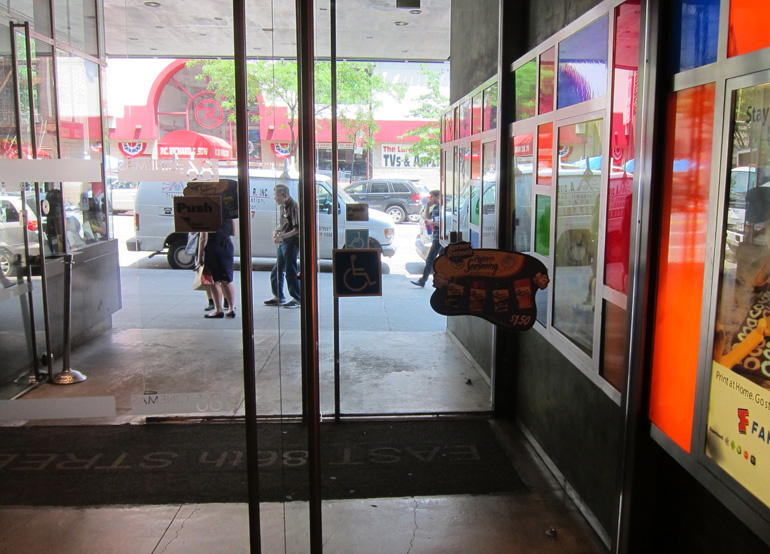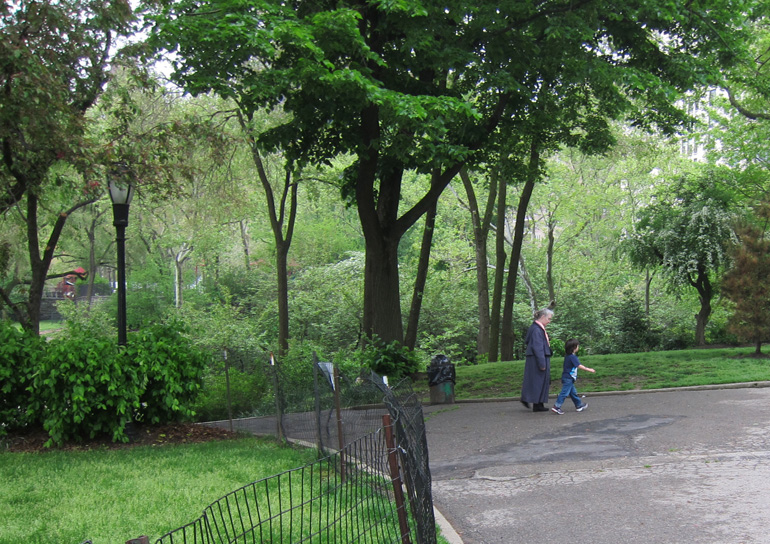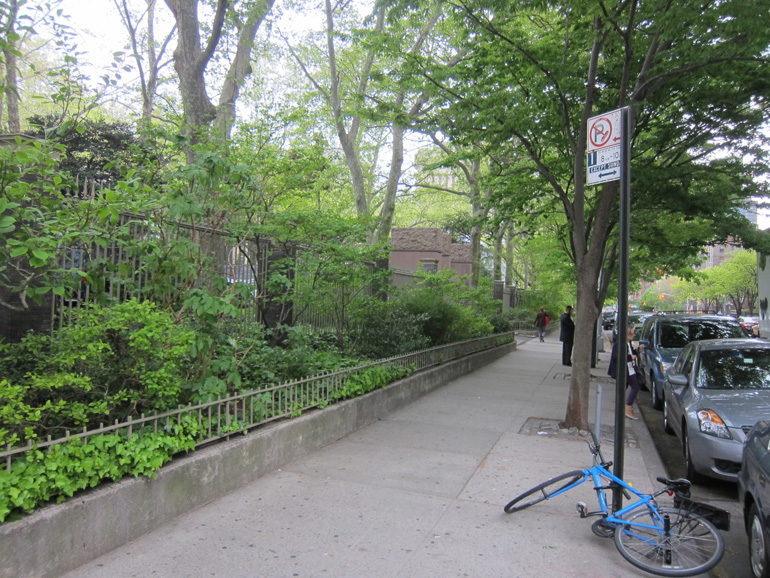
This is the year of Obnoxious Weather, 2013. I shall pass over the protracted winter, and the sketchy, belated spring. It’s bad enough to be hot to the bone, as I still am after three days of clammy, warm humidity, during a retour à l’hiver, on which temperatures plunged to a positive chill. And, I’d planned a picnic. Our first dinner party on the balcony. Phut to that! Rain and atmospheric miserableness pushed us indoors.
The picnic was a second choice. I’d wanted, originally, do an Italian menu, some pasta followed by a roast. But Kathleen said, “tomorrow will be hot: don’t do pasta.” So: picnic. The day turned out to be so not hot that I considered changing the menu altogether, even after getting the picnic underway. The marinating grilled chicken and the potato salad — well, the wonderful thing about a picnic menu is that nothing is very expensive. But I couldn’t decide on the pasta course that a revised approach would require. I considered a risotto, even. (The roast was always going to be an already not very ambitious tenderloin.) But I stuck with what I’d started, and, in the event, we had a very pleasant dinner. I preserved the most important element of a picnic: we ate on the love seats, not at the table.
My arc of errands, as announced — was it yesterday — I reversed, heading east to west, from the barber to Crawford Doyle to the Museum and then home, via a second visit to Fairway. I’d known that the European Painting (I call them “Old Master” and don’t know why the Museum doesn’t) galleries had been under some sort of reconsideration, because on my last visit, just a few weeks ago, I had to walk a narrow path through them to get to the American Wing. I’d had no idea of a total overhaul until this morning’s Times. That’s not quite correct, though: last night, at the one spring cocktail party to which I’ve been invited this year, I’d been chatting to a very nice lady who “teaches art history to inner-city kids.” When I told her about picking my way through cordoned-off galleries, she as good as told me what I read in this morning’s paper.
I had planned, as announced, to take a farewell view of three or four paintings in the Impressionist show — two Tissots, one Degas, and the Caillebotte a print of which I’d had in my dorm room sophomore year. After I’d done that (and written down the names of the gents in Tissot’s group portrait of the Cercle de la Rue Royale, shamefully absent from the show’s catalogue), I walked through the new German/Netherlandish galleries, which occupied what I used to call “the Old Master Exhibition space.” So many wonderful shows there — Van Gogh’s drawings, “Americans in Paris.” But the age of big shows from abroad is setting, if not over. I will say without reservation that the new arrangement is an improvement. But it is a great change, and it will take a few visits to grasp. Happy challenge! I certainly didn’t envy the crowds of visitors — the place was beyond packed — who didn’t know how things used to be.
***

Central Park on Memorial Day weekend! And yet we had a very good time. The Park was certainly very beautiful; this is the time of year when it looks its welcoming best. Aside from a few contests of will about the forbidden climbing of rocks, it was a very smooth visit, especially considering that we didn’t really know where the Carousel is. Kathleen thought that it was close to Fifth Avenue, but although I knew that this was not the case I had no clear idea of the actual path. In the end, I consulted my phone, something I never do. Moments later, we looked down the Mall and espied the fellow who was generating gigantic bubbles with a witches’ brew of soapsuds, two poles, and two bits of string. Will was as enchanted as can be imagined. Shortly after that, we found the Carousel, where Will was treated to two rides, the first on a horse, the second in a (non-moving) sleigh — his idea. I climbed aboard for the latter junket, which Will spent staring at the designs on the pillar at the hub.
We had been to the zoo just before. For the first time — Kathleen and I. I don’t think that we had been to the Central Park Zoo since its complete overhaul a decade or so ago. We remembered when there was an elephant, and the monkey house stank to high heaven. It is all very different now, just like the Cloisters — although perhaps it is easier for most people to see the change at the zoo. We are looking forward to the Cloisters party early next month; we’ve reserved seats on the bus. This month’s Metropolitan Museum of Art Bulletin is devoted to “the making of the Cloisters,” and I pore over the photographs with inexplicable fascination. At that cocktail party last week, I killed people with my crack about being depressed to learn that the Cloisters is not ten years older than I am, not quite. “It’s May, and I’m January.” Even though the Cloisters was built to look old, very old, it is disconcerting to be so not-much-younger than a monument that everyone takes for granted. It will get worse if I go on continuing to age: pretty soon, I’ll be moaning that the Empire State Building is a lot less than twenty years older than I am. Egregious showing-off, of course, is what it really is.
As we were taxiing home from the Park, Kathleen was inspired to tell Will about Ye Olde Days on 86th Street, when barrels of beer were rolled down the hill from the Ruppert Brewery (on Third Avenue, a few blocks north) to the East River, where they were loaded onto barges. “Why?” Will asked. The question was pro forma, so we were surprised that he took the answer so seriously. “Because there were no cars or trucks in those days,” said Kathleen. Will was genuinely shocked. He has evidently crossed the imaginative threshold beyond which it is really possible to believe that things were not always as they are. He is familiar with pictures of himself as a baby, and of Kathleen and me as obviously much younger people. But — no cars!
All I could think of was: And there were no iPads until you were three months old, either. Just wait! But I said nothing.
***

Later, there was a Simplicitas moment. That’s a reference to Unfaithfully Yours, perhaps my favorite Preston Sturges comedy. I’m not going to explain what “Simplicitas” means; if you see the movie, as you ought to do, you’ll know the folly of my believing, before the Simplicitas moment, that I could go to an electronics store and buy a flat-screen LED monitor and a VCR/DVD recorder and hook everything up, no problem. The Simplicitas moment was not fun.
But I got the thing to work. Don’t ask me how — that’s the frightening part.
It all began yesterday afternoon whilst watching Kipper. One disc of programs had come to an end and it was time to insert another. I pressed the wrong button. It was not really the wrong button, but just the wrong button at the time, because, at the time, the component whose button I pressed by mistake, through which signals passed from the DVD player that I actually use to the NEC vacuum-tube television that we bought sometime prior to 1990 and have been enjoying until recently — this intermediate machine, it went toast. It’s I/O button made noises like that of a cockroach in rigor mortis. A pale light caused the meaningless word “Auto” to flash in the display. As to the NEC, its picture had begun to deteriorate. There were all sorts of rolling effects that I don’t know how to describe any better. Although they did not make watching movies unpleasant — and that is all that this piece of consumer electronics was ever called upon to do; never was it attached to cable — they suggested that perhaps, just perhaps, we had got our money’s worth out of the thing. And then some.
There’s a wonderful line in the Fawlty Towers episode, “The Builders,” where Sybil says that “it will probably all come crashing down by lunchtime,” or somesuch. That’s how I feel about the new equipment. I shall probably have to figure, all over again, how I managed to get the flat screen to “read” the input from the DVD/VCR combo. I haven’t had the nerve to find out how the setup deals with videotapes, but I did discover that the new arrangement imitates the old in defaulting to the separate all-region DVD player whenever there is no disc in the combo tray.
On an ordinary day from the past six months, setting up a new screen/player outfit would have been a good day’s work, but today it was but an interlude in a scarily productive program. In the morning, I went through the kitchen like an Old Testament angel, casting bagsful of old food into the Hades of the garbage chute. When I had done, there was a lot of empty space in the refrigerator, more than ever before ever. I would open the door from time to time just to check: still empty. Empty-ish, anyway. Then, after a nice lunch at Demarchelier (the key to the day, I suppose) and our shopping expedition at PC Richard, and the hooking up of our catch, I tidied the bedroom and the living room. I forgot to mention!: I saw to the blue room right after breakfast; that was how I got started. At a few minutes past eight in the evening, I put the cleaning gear away, changed into fresh clothes, and sat on the balcony for a while, luxuriating in the lights coming on. Somebody in a garden-level apartment was giving a party, and although I could hardly make out the revelers, and they didn’t seem to be very numerous, the delicious racket that they put out made me intensely nostalgic. I suppose that all parties sound the same, but there is something about the sudden, surprised sound of a woman’s beautiful laugh that strikes me as stamped in Manhattan. Even when you can see that everyone is in T shirts and camisoles, everyone also sounds very grown up, and pretty much like the far more buttoned-down adults of my childhood. Fun, in this part of the world, is probably a constant.
Hearing the people down in the garden having a good time — their voices soared up to my balcony, but you couldn’t have heard them standing on the street outside their building — I didn’t wish that I was one of them, but I was hugely happy for them, and I hoped that they all had the exact wonderful time that they’d had in mind when they set out for the evening, even though I know that this can’t have happened to more than two people at most. And then I realized that I was having that good time.






















